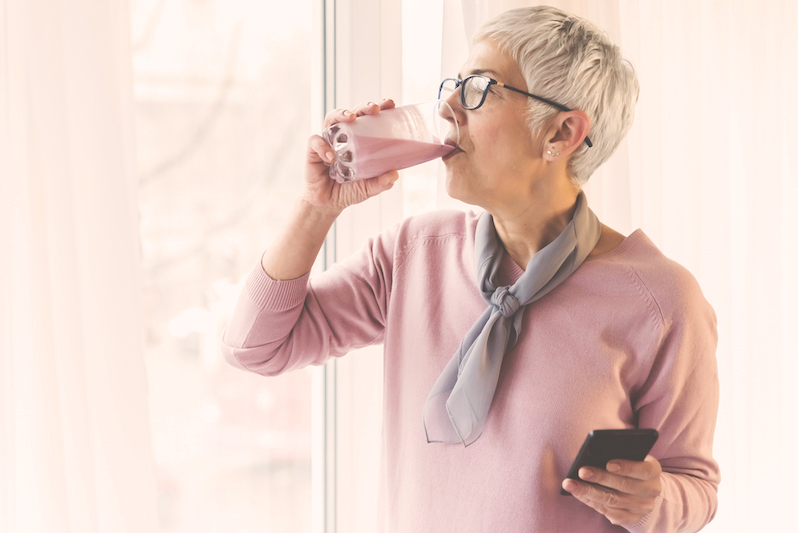
It’s no secret that our bodies change a lot during menopause. Sometimes, it may even feel like they are rebelling against us. That’s especially true for those struggling with maintaining a healthy weight.
On average, women gain 2 to 5 pounds in the decade leading up to menopause, but some, even those who never had a weight issue before, will gain much more.
The reality of menopause and weight gain
To be clear: gaining weight is a normal part of aging. And most women carry the extra weight around their hips and thighs. Hormonal changes like the decrease in estrogen around menopause combined with the loss of muscle mass that we all experience as we grow older make it increasingly difficult to lose the pounds.
These changes call for a new way to approach health. The diet and exercise routines that worked when you were 30 will not cut it when you’re 50. And nutrition plays a more important role in maintaining a healthy weight than it did before.
Protein is key
“Loss of lean body mass starts in the 30s and 40s,” says Douglas Paddon-Jones, Ph.D., a professor in the department of nutrition and metabolism at The University of Texas Medical Branch. “Women need to understand the impact diet has on muscle loss the same way they understand how diet affects osteoporosis risk.”
To promote muscle-protein synthesis — which your body uses for growth, repair, and maintenance of skeletal muscle, countering the loss of muscle mass — it’s crucial to have protein at every meal. One study from Paddon-Jones revealed that 25 to 30 grams of protein per meal is needed for muscle-protein synthesis.

For a lot of women, this means a big change in the way they approach their protein intake. Here are some suggestions:
- Breakfast. The average American gets only about 10 grams of protein at breakfast, but it’s easy to add more. Whole grain toast, peanut butter, and low-fat yogurt all add extra protein to your meal. If you’re more of a grab-and-go gal, a protein shake is a way to go. For extra credit, you could add almond butter. Other high-protein breakfast options include egg whites, scrambled tofu with vegetables, and Greek yogurt with almonds. Here are a few other ideas.
- Post-workout. Your body needs protein after a workout to help build muscle, so keep a stash of protein-rich recovery snacks. Shakes and smoothies are perfect for getting all the recovery nutrients you need. One simple recipe is a scoop of your favorite protein powder, a cup of milk, 6 ounces of Greek yogurt, 2 tablespoons of peanut butter, one banana, a dash of honey, and a handful of ice. Throw it all in a blender, and presto! You have a delicious, protein-packed smoothie. Check out these other fast and easy protein shake ideas.
- Snacks. A protein-rich snack will help keep you from getting hungry and gives you another opportunity to boost your protein intake. Almonds are a good snack; an ounce contains 6 grams of protein. Greek yogurt, string cheese, and cottage cheese are great options too (and you’ll get calcium). Veggies and peanut or almond butter, edamame, roasted chickpeas, and hard-boiled eggs are all delicious and healthy snacking options.
Exercise is crucial
Yes, you likely need to up your protein intake at every meal, but you also need to exercise. Jogging and resistance training are especially good forms of exercise for women over 50 — as they have the bonus of promoting bone health.
If 60 minutes a day of exercise sounds like a lot, do what you can. The key is consistency. To determine your baseline, track your activity with a Fitbit or a fitness app on your phone. Once you know how much you normally move, you can bump it up from there.
Sitting less is important, too. If you sit all day at work, consider a standing desk or set a timer to remind you to get up and move every hour or so. Take walks at lunch, use the stairs instead of the elevator, and park your car far from the grocery store door. Every little bit helps.
Making incremental changes in diet and exercise is key for maintaining a healthy weight after 50. It’s OK to start small and tweak till you are getting the nutrients and activity that is ideal for you. With a protein-rich diet and an active lifestyle, a healthy weight before and menopause is achievable.
FemmePharma has been helping women navigate menopause for over two decades. No matter where you are in your journey, you deserve to have knowledgeable, intimate healthcare partners to help you feel your best. Explore our other articles, podcast episodes with women’s health experts, and products to ease your transition into menopause.